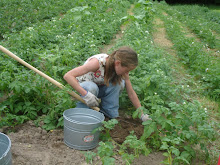
It's been a pretty fun winter for us. We took a vacation to Florida, which was great…we went to the beach, did some hiking and biking, saw some manatees and went to a farmer’s market. Very fun! Lately I’ve been shoveling snow, looking after my livestock and planning the CSA garden.
The 2011 CSA season is right around the corner! Last year we sold out our St. Paul drop in March and our Stillwater and Hudson drops in April. I’ll start taking on brand spanking new members on February 1. Alumni members are welcome to sign up any time (thanks to all who already have!).
Delivery Locations: I deliver to River Market Co-Op which is located in downtown Stillwater; Fresh and Natural Foods in Hudson; and Hampden Park Co-Op in St. Paul (928 Raymond Ave., fairly near Midway Stadium).
Delivery Days and Times:
River Market Co-op in Stillwater: boxes are delivered on Mondays members pick them up between 1:30 and 9p.m.
Fresh and Natural Foods in Hudson: boxes are delivered on Mondays members pick them up between 2:30 and 9p.m.
Hampden Park Co-op in St. Paul: boxes are delivered on Wednesdays members pick them up between 2:00 and 9p.m.
Share Sizes: I offer full and half shares, both are delivered on a weekly basis. Full shares come in a bushel box, half shares will be packed in a half bushel box. I just love to send out boxes that are plumb full…but in the beginning of the season this is not always possible. On the flip side it can be difficult to fit everything in the boxes towards the middle of the season. In the thick of last year’s season I was running 18-20 different types of veggies in the full-share folks’ boxes and 9-10 different types in half share boxes.
What Size is Best for You? That’s a good question. The full shares are for roughly four people and the half shares are for right around two people. That being said, a pair of serious vegetarians could probably handle a full share. Also, a family of four with children may be just fine with a half share.
Pricing: Full shares sell for $500 and half shares sell for $255.
Box Contents: Here’s what’s on the list for this year: basil, beans, beets, broccoli, Brussels sprouts, cabbage, carrots, celery, chard, cilantro, corn, cucumbers, dill, edamame, eggplant, fennel, gourds, hot peppers, kale, kohlrabi, lettuce, melons, onions, parsley, peas, peppers, potatoes, pumpkins, radishes, rutabaga, spinach, summer squash, winter squash, tomatillos, tomatoes and turnips.
I like to try out new things in my garden. This year I’ll be taking a crack at: okra, cauliflower, fingerling potatoes, some new varieties of broccoli, green zebra tomatoes and anything else that strikes my fancy.
Fruit: I’ve been working on this for the past three years. Fruit takes awhile. I’ve got quite a few fruit projects started…but the only thing I feel comfortable promising for this year is rhubarb. However, some of my efforts may come to fruition this year and if they do, they will certainly show up in your boxes.
Our Season Length: This year I’ll be doing 18 weeks starting the second week in June and going until the second week in October. This means that for Stillwater and Hudson folks their first box will be on June 13. St Paul folks’ first box will be on June 15.
How to Contact Eener’s Farm: If you are interested in signing up please e-mail me at eenermachine@gmail.com and I will send you a sign up form. Or you can call me at 715.643.2803 and I’ll sign you up over the phone.
This is all fine and good, but what the heck is a CSA anyway? Basically, a CSA (which stands for Community Supported Agriculture) is a type of direct market farm, meaning the farmer sells food directly to customers. There are a lot of advantages to this kind of farm. For one, customers/members know exactly where their food is coming from (we encourage our members to come visit the farm and we hold a big party at the end of the season for everyone). Secondly, produce from CSA farms doesn’t travel far. As a result it’s better for the environment and members enjoy much fresher produce. Another perk is that CSA farms tend to be really diversified (we grow about 40 varieties of veggies plus herbs) so members get a nice variety of in-season veggies.
Risk. Since farming is so completely tied to the weather, it’s risky business. My goal is to provide my members with an amount of produce that is equal to the money they paid for their share. Over the past two years I think I accomplished this goal. But I can’t promise that this will be true for this year. It’s helpful to think of CSA farms in terms of the stock market; when members buy a share they are making an investment. On a good year they will break even or get an amount of produce that is greater in value than their initial investment. On a bad year, they may end up with an amount of produce that is worth less than what they invested. In buying a full season of produce, the members of CSA farms share the risk with their farmers.
Is Eener’s Farm Organic?: I’m not certified organic, so I can’t advertise myself as organic. I do advertise as “Chemical Free” which means I don’t use any chemical pesticides or herbicides in my farming operations. I looked into the process to become certified and it does involve an investment, which I’d be willing to make. It turns out that being certified also involves TONS of paperwork and record keeping… not my strong points. So at this point I am not pursuing a certification though I remain committed to organic gardening.


No comments:
Post a Comment